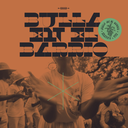TRACKLIST
San Antonio (fandango)
Madre Luna (sentao)
Madre Sol (fandango)
Madre Fuego (sentao)
El Bocao (chalupa)
Colombia sin Panamá (sentao)
Akie en la avenida (chalupa)
Vámonos (chalupa)
DESCRIPTION
-First and only bullerengue group in the US.
-Led by Combo Chimbita-members Carolina Oliveros and Niño Lento es Fuego.
-Debut album of eight original spirituals (Side A) and traditionals (Side B).
-Limited to 500 copies worldwide.
-Opaque white vinyl and full-color insert.
“During the pandemic, I was hearing drums all the time,” says Carolina Oliveros, who leads the New York-based group Bulla en el Barrio. “Not only bullerengues, but also tamboritos panamanians, solomas – like panamanian styles – also I’ve been listening to salve, which is a rhythm from Dominican Republic. I always want to try to create a bullerengue that sounds more traditional but also sounds like me with my own influences.” Since 2015, Bulla en el Barrio has been envisioned as a collective and a study group of the traditional rueda de bullerengue – dance music originating from the Caribbean coast of Colombia that transmits ancient African rhythms and knowledge. Oliveros and Bulla co-founder Camilo Rodriguez – both in NY tropical futurism band Combo Chimbita – first experimented with writing their own bullerengue during their monthly residencies at Barbès in Brooklyn, culminating in two singles released by Names You Can Trust in 2017. Thanks to these recordings, these two Bulla en el Barrio compositions are now sung in music festivals and ruedas all over Bullerengue territory. They now presents eight original songs recorded live to tape, preserving and documenting the participative and rough vibes of the ruedas and performances. “We’ve been playing together since 2015,” says Rodriguez. “The group is a space to study, connect, to learn, so this record captures a moment where we were – taking a picture of a process. This was just what was happening at that time. It was a way to document what we were doing and our process learning, documenting bullerengue.”







